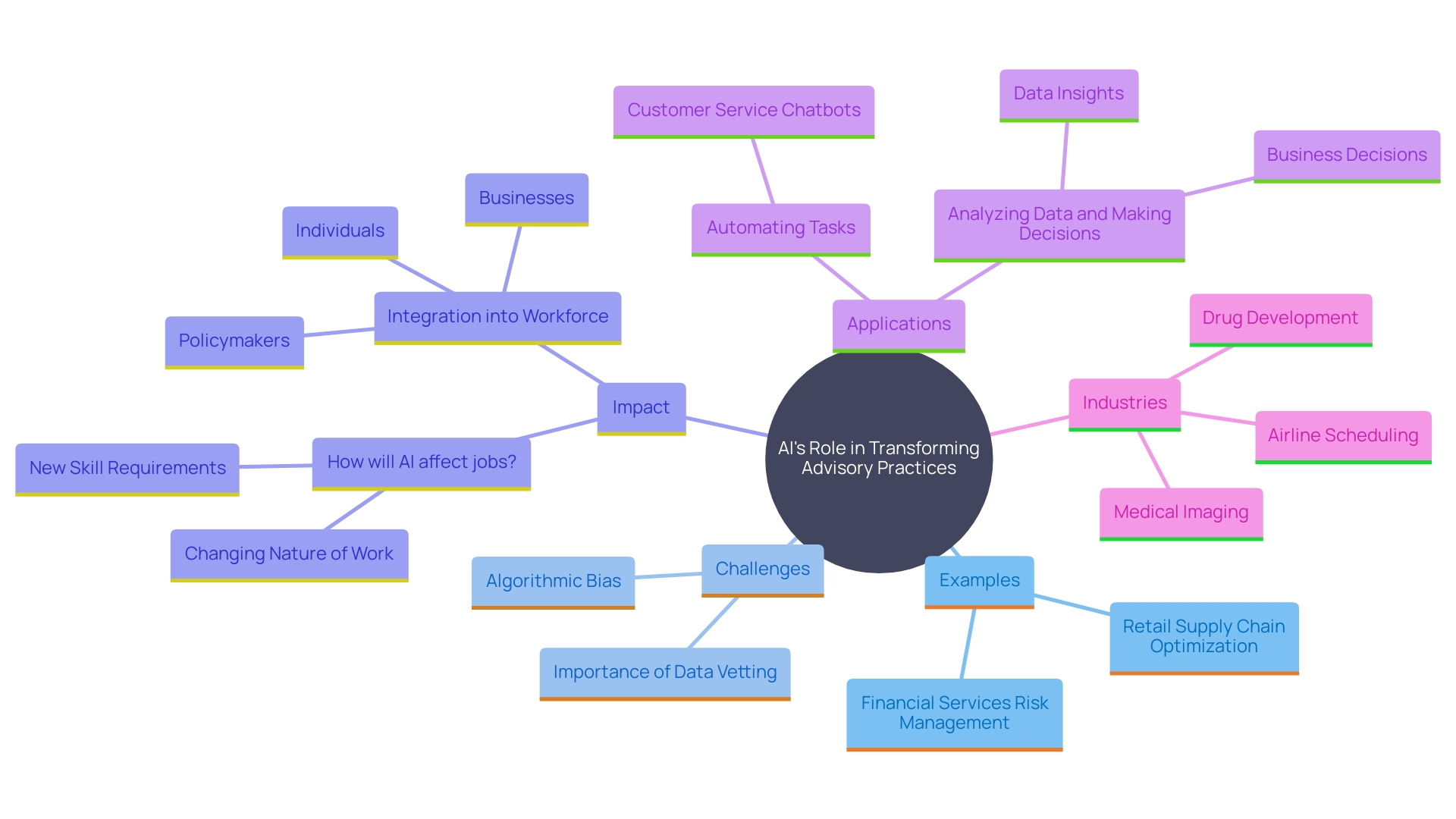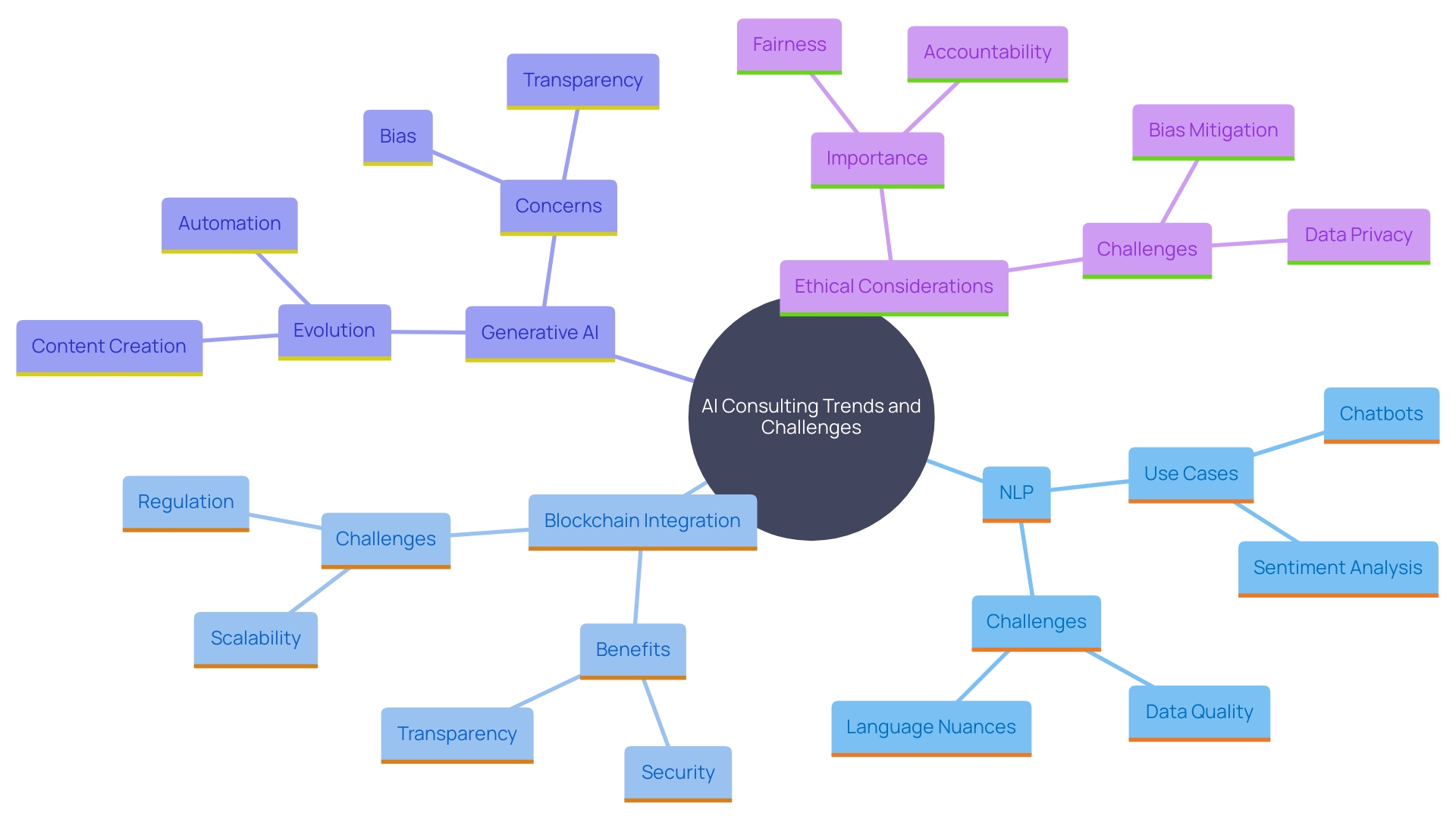Introduction
Artificial intelligence (AI) is progressively reshaping the landscape of consulting services, enabling firms to automate routine tasks, enhance data analysis capabilities, and employ predictive modeling for more informed decision-making. This evolution not only accelerates the generation of insights but also allows consultants to offer more precise and tailored recommendations. By leveraging AI tools, consultants can delve into vast datasets, uncovering trends and patterns that manual analysis might miss, thus refining their strategic advice.
However, the integration of AI into consulting is accompanied by substantial challenges, such as the potential for bias in AI algorithms, which can lead to skewed outcomes if the underlying data is biased. Addressing these concerns is essential to ensure the reliability and transparency of AI-driven solutions. Despite these hurdles, the transformative potential of AI in driving business innovation and growth is undeniable.
Leaders in the field recognize AI's capacity to enhance risk management, foster innovation, and improve strategic decision-making, as highlighted by reports from prestigious forums like the Davos World Economic Forum.
The practical implementation of AI in consulting is exemplified by industry leaders who have adopted these technologies early, maintaining a competitive edge in an ever-evolving technological landscape. These advancements underscore the necessity for consulting firms to integrate advanced AI applications, thereby redefining efficiency and expanding their service capabilities.
The Role of AI in Enhancing Consulting Services
Artificial intelligence (AI) is transforming advisory services by automating routine tasks, enhancing data analysis, and enabling predictive modeling. This transformation accelerates the delivery of insights and informs decision-making. Consultants can now utilize AI tools to scrutinize extensive datasets, revealing trends and patterns that were previously difficult to detect manually. This innovation not only enhances the advisory process but also enables more precise recommendations and strategies tailored to specific business needs.
The adoption of AI in consulting is not without its challenges. One significant concern is the potential for bias in AI algorithms, which can lead to skewed recommendations and decisions if the data used is biased. Ensuring unbiased and transparent AI systems is critical for delivering reliable results. Despite these challenges, the potential of AI to propel growth and transformation is evident. A report launched at the 2024 Davos World Economic Forum highlighted that industry leaders view AI as an opportunity to facilitate innovation, improve risk management, and enable better decision-making.
The case of Marty Fisher exemplifies how openness to new technology can maintain a competitive edge. By embracing AI early in his career, Fisher's business has stayed ahead in a rapidly evolving technological landscape. This example highlights the significance of incorporating advanced AI applications in advisory services to redefine efficiency and capabilities in the industry.
Benefits of AI in Strategy Consulting
Integrating AI into strategy consulting offers transformative benefits, including enhanced operational efficiency, superior accuracy, and the ability to generate real-time insights. AI algorithms excel at processing and analyzing large datasets, far surpassing human capabilities, which leads to more informed and strategic decisions. For example, AI can quickly identify new market opportunities and optimize resource allocation, fostering growth and ensuring a competitive edge. According to recent studies, businesses that have adopted AI have seen significant improvements in operational efficiency. These advanced technologies are instrumental in automating repetitive tasks, allowing professionals to focus on more impactful activities. In the tourism and hospitality field, AI has transformed processes, showcasing its extensive potential across various sectors. As Dr. Rachel Fu notes, the adoption of AI practices in these industries underscores its importance in driving innovation and maintaining industry leadership.
Concrete Uses of AI in Strategy Consulting
AI can revolutionize strategy consulting by providing deep insights and predictive capabilities across various domains like market analysis, customer segmentation, and risk assessment. Machine learning models, for example, can scrutinize customer behaviors to identify high-potential segments, enhancing conversion rates. Ai's ability to simulate different commercial environments based on historical data offers a robust tool for scenario planning. This enables consultants to craft adaptive strategies that are responsive to evolving market conditions.
In a rapidly changing commercial environment, AI's role in strategic decision-making cannot be underestimated. According to recent statistics, AI adoption is highest in marketing and sales (34%) and product or service development (23%), underscoring its widespread impact across business functions. The emphasis on information quality and quantity is crucial; enterprises recognize that their information is one of their most valuable assets. Effective AI implementation hinges on having the right data in the hands of experts to train models, ensuring predictable and reliable outcomes.
Moreover, AI-driven tools are being integrated into various aspects of corporate growth strategies, such as corporate venture building, which has gained popularity for creating lasting value. This approach offers several advantages over traditional methods like venture capital or mergers and acquisitions, proving to be highly effective in today’s disruptive economic environment.
The application of AI in market research further demonstrates its value. AI efficiently manages secondary research objectives, assisting organizations in making informed choices based on well-structured insights. As noted by specialists, the combination of primary research methods and AI-driven analysis provides a comprehensive understanding of the competitive landscape.
Embracing AI is no longer a mere opportunity; it’s a strategic imperative for any organization aiming to thrive in the digital era. The technology's powerful and flexible nature means it can be applied in numerous ways to drive innovation and boost customer engagement, making it indispensable for forward-thinking businesses.
Case Studies of AI in Consulting
AI has proven instrumental in transforming advisory practices across various industries, showcasing measurable improvements. A prominent consulting firm leveraged AI-driven analytics to optimize a retail client's supply chain, achieving a significant 20% reduction in operational costs. This success was rooted in identifying key processes and stakeholders, such as inventory management and online shop software, and targeting low-complexity tasks for quick wins, like automating identity verification and order inquiries. Ludovic Doudard of Renault emphasized the significance of a structured information approach, as Renault's digitized information lake allowed for precise control over their supply chain, further enhancing efficiency.
In another instance, a financial services firm integrated AI to bolster risk management, leading to enhanced regulatory compliance and diminished financial losses. This reflects the larger trend in the banking industry, where AI and cloud computing have transformed Anti-Money Laundering (AML) compliance by handling extensive amounts of transaction information with enhanced precision. As a result, banks can make more qualified decisions, ultimately improving operational efficiency.
While generative AI offers substantial benefits, such as enhanced decision-making and problem-solving capabilities, it also brings concerns about algorithmic bias and transparency. Ensuring reliable results necessitates rigorous vetting of foundational data sources, as biases in machine learning models can perpetuate negative outcomes. Despite these challenges, the integration of optimized AI applications continues to redefine efficiency and expand the capabilities of advisory services, demonstrating the profound impact of AI on driving strategic decisions and delivering value.

Future Trends in AI and Consulting
The future of AI in consulting is set for transformative advancements. Key trends include the growing use of natural language processing to enhance client interactions and the integration of AI with blockchain technology to strengthen information security. As generative AI continues to evolve, consultants will need to navigate challenges such as potential algorithmic bias and the need for transparency in AI-driven decision-making. Ensuring unbiased outcomes starts with vetting data sources that underpin AI systems, as highlighted by industry experts. Moreover, the demand for AI-driven services is surging, offering consulting firms new opportunities to innovate and expand their offerings. In this dynamic landscape, ethical considerations and regulatory compliance will become increasingly critical, requiring consultants to adapt and refine their strategies continuously.

Conclusion
The integration of artificial intelligence (AI) into consulting services is reshaping the industry by automating tasks, enhancing data analysis, and enabling predictive modeling. This transformation accelerates insight generation and empowers consultants to deliver tailored recommendations that meet specific client needs. AI’s capacity to analyze extensive datasets uncovers trends that might otherwise be missed, refining the consulting process.
However, the adoption of AI also brings challenges, particularly the risk of bias in algorithms. Ensuring transparency and reliability in AI-driven solutions is essential to maintain the integrity of recommendations. Addressing these concerns is crucial for using AI as a tool for equitable decision-making.
Despite these challenges, AI’s potential to drive innovation and growth is clear, as highlighted by insights from industry leaders at forums like the Davos World Economic Forum.
Real-world applications of AI demonstrate its effectiveness in strategic consulting, from optimizing supply chains to enhancing risk management. These advancements yield measurable improvements, showcasing AI's value in increasing operational efficiency. As technology evolves, a focus on data quality and ethical considerations will be vital for firms aiming to maintain a competitive edge.
Looking ahead, the future of AI in consulting includes advancements such as natural language processing and blockchain integration. The increasing demand for AI-driven services presents opportunities for innovation while requiring a commitment to ethical practices and regulatory compliance. Firms that successfully navigate these dynamics will enhance their offerings and solidify their positions as trusted advisors in an ever-evolving business landscape.




